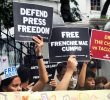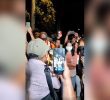Official Public Statement of Assumption College of Davao on the campaign against drugs and call to continue peace talks
Support what is right, stand up in rectifying the wrong
The past months under the Duterte administration have seen contentious views in regard to the President’s war on drugs that, according to reports, has already claimed the lives of at least 7,028 people of mostly poor and impoverished origins. The alarming incidents of alleged extrajudicial killings involving the police have generated condemnation from various groups, including prominent Church leaders, and has prompted the president to express his tirade in the media targeted at certain personalities of the Church.
These Church personalities, too, found themselves embroiled in a tit for tat that has turned ugly and been widely circulated in the mainstream and social media—an entanglement that raised brows even among the faithful.
As an institution that forwards quality Transformative Education, we take on the responsibility of articulating the discourse of these complex issues. We let the holistic perspective and guidance to the faithful, as a matter of principle and moral responsibility emerge.
We take a cue from Pope Francis’ exhortation that “it is necessary to confront the problems underlying the use of these drugs, by promoting greater justice, educating young people in the values that build up life in society, accompanying those in difficulty and giving them hope for the future.” Hence, it is best to engage first-hand with the victims of substance abuse in our responsibility to guide the lost back to the folds of the Creator.
The Assumption College of Davao has taken such steps forward with our Project Paglaum spearheaded by the Community Extension Services Office together with the Agdao Parish and our LGU partners at the barangay level. Some other Catholic schools in Davao City may also be doing their own initiatives to respond to the call of the times.
As part of the Church, we should look into forwarding and strengthening these practices instead of provoking a spat with the present government. To engage in needless and hostile confrontation with President Duterte, for example, is counter-intuitive to the goal of contributing to the fight against dangerous and illegal drugs, and isolates us from the public by squandering the opportunity to conscienticize the main actors in the government to uphold human rights and due process of law.
It is incumbent upon the school apostolates to be at the forefront not only in the engagement with the faithful and the wider public but more so with the government. This idea of critical engagement with the present government stems from the principle that as members of the academe, we are in a better position to partner with the state and provide impetus in putting to good use the state machinery to serve the interest of the public, especially the poor.
In consonance to this, we must also look to the merits of the positive gains of the present administration in addressing other equally pressing social issues such that of the efforts in moving for an inclusive development, environmental protection, independence, social justice, and peace.
Combating the scourge of drugs while reforming the state apparatus that is supposed to implement it—the PNP—is sure to be a challenge to the Duterte administration. With the termination of the reciprocal ceasefires and of the peace talks between the GRP and the NDFP, it is all the more imperative for us to take a major and deeper involvement calling for its continuation and never stop providing a climate for dialogue and conversation. The government and the Church must work together addressing the clamor of the people; to support what is right and to stand up in rectifying the wrong, without building walls that divide and confuse the faithful.





![[ANALYSIS] A different drug war](https://davaotoday.com/wp-content/uploads/2024/09/1000019103-110x100.png)




